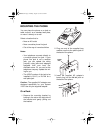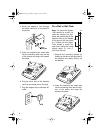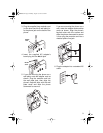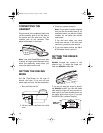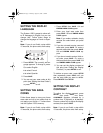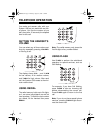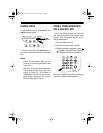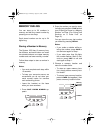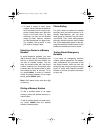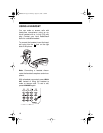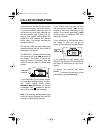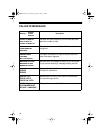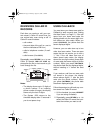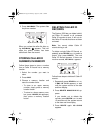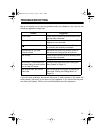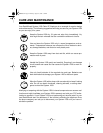
15
4. To keep a record of each stored
number, use a flat-blade screwdriver
to lift the plastic cover from the tele-
phone number index card. Write the
name on the index card. For easy
reference, you can use the shaded
areas for lower memory numbers
and the blank areas for upper mem-
ory numbers. Use a pencil in case
you want to change it later.
Entering a Pause in a Memory
Number
In some telephone systems, you must
dial an access code (9, for example) and
wait for a second dial tone before you
can dial an outside number. You can
store the access code with the phone
number; however, you should also store
a pause after the access code to allow
the outside line time to connect. To do
so, press
REDIAL
to enter a 2-second
pause.
P
(pause) appears. For a longer
pause, press
REDIAL
again.
Note
: Each pause entry uses one digit
of memory.
Dialing a Memory Number
To dial a number stored in an upper
memory, press the desired memory lo-
cation button.
To dial a number stored in a lower mem-
ory, press
LOWER
then the desired
memory location button.
Chain-Dialing
For quick recall of numbers for special
services (such as bank-by-phone or al-
ternate long-distance), you can store
each group of numbers in its own mem-
ory location. Then, when calling special
services, dial the service’s main number
first. At the appropriate place in the call,
press the memory location button for the
additional numbers you want to send.
Testing Stored Emergency
Numbers
If you store an emergency service’s
number (police department, fire depart-
ment, ambulance) and you want to test
the stored number, make the test call
during the late evening or early morning
hours to avoid peak demand periods.
Remain on the line to explain the reason
for your call.
43-986.fm Page 15 Monday, August 16, 1999 5:16 PM



